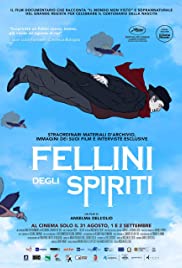
FELLINI OF THE SPIRITS
Italy, 2020, 100 minutes, colour/black and white.
Directed by Anselma Dell’ Olio.
This documentary was made as part of the celebrations of the centenary of the birth of celebrated Italian director, Federico Fellini.
This is not so much a review of the documentary but a recommendation that all Fellini fans take the opportunity to see it. And, to indicate, that for film buffs it may be quite an exhilarating way to be introduced to the work of Fellini.
The film is filled with talking heads, Italian experts, offering all kinds of interesting perspectives on the films, on Fellini himself and his wife, Giulietta Masina, on his background and interest in circus and grotesques, in more transcendental themes, the background of Italian Catholicism, his being rooted in Italian culture, various experts who intrigued him an influence his films, including Carl Jung, other psychologists and experts in paranormal phenomena.
For English-language audiences, the talking heads include directors William Friedkin, Terry Gilliam, Damien Chazelle.
The film is organising various chapters, highlighting Fellini’s background, his interests. Not all of his films are covered, depending on one’s point of view, some interesting absences, brief references to Amarcord, practically nothing on Fellini’s Roma, important as it was as a satire on things ecclesiastical. While there are some references to later films (perhaps not enough, for example Ginger and Fred), quite a lot of detailed attention is given to some of the pre-La Dolce Vita films, especially La Strada and Nights of Cabiria and, especially, Il Bidone and The White Sheik. Which means that the main attention is given to the classics of the 1960s, most especially Juliet of the Spirits and interesting comment on 8 ½. (Nothing from Satyricon, brief mention of Casanova.)
Many of the commentators indicate Fellini’s technical skills, his use of black-and-white photography, colour photography, editing and pace. There is, towards the end, a tribute to composer Nino Rota including some comments from him.
As has been said, this is a strong recommendation for a Fellini experience or an enticing introduction.